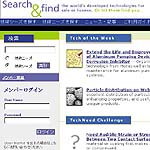Unused Patents Could Prove a Boon to Japanese Companies
Back to Contents of Issue: August 2002
|
by Sumie Kawakami |
|
 Ryoichi Shichijo, vice president of online patent information provider yet2.com Asia Pacific, has a story to share about the patent business in Japan. One of his Japanese clients had an unused patent to sell. The company asked yet2.com to write the specifications in order to sell it on the Web. After the information was posted, a person inside the same company said his division wanted to use the patent.
Finding a useful patent is like finding a treasure at a flea market. Documentation is often unclear but unused patents have the potential of creating profits if found and used properly. Ryoichi Shichijo, vice president of online patent information provider yet2.com Asia Pacific, has a story to share about the patent business in Japan. One of his Japanese clients had an unused patent to sell. The company asked yet2.com to write the specifications in order to sell it on the Web. After the information was posted, a person inside the same company said his division wanted to use the patent.
Finding a useful patent is like finding a treasure at a flea market. Documentation is often unclear but unused patents have the potential of creating profits if found and used properly. "Big US corporations use only 10 percent of their patents," says Shichijo. The patent rush in the US came during the 1990s as the concept of intangible property spread among big corporations. IBM, for example, acquired about half of all its patents during that one decade. Japanese corporations slowly followed the same path. Big manufacturers such as Canon followed the Western example in rushing to patent its technologies before somebody else did. But increasing R&D costs were putting pressure on profitability. "Corporations (in the US and Europe) used to think of R&D expenditures as a cost, but now they are talking about it in terms of return on investment," he says. Corporations -- Western or Japanese -- used to be too proud to use technologies that were not invented in-house. Or they considered the idea of selling their technologies to be akin to leaking their deep secrets. But with the changing climate, they now don't mind buying technologies found elsewhere as a way to cut down R&D costs. They've also found that licensing their patents can be a lucrative business. IBM, for example, made as much as $15 billion out of intellectual property during 2001, about 100 times more than 15 years ago. Japan is behind the US as far as intellectual property issues are concerned, but changes are on the way. NEC, for example, announced recently that the company will focus more on licensing out its technologies and patents. According to the Japanese media, the company currently makes JPY20-40 billion by licensing technology and patents; it aims to increase the revenue to JPY50 billion within three years. NEC has established a division of 75 people specializing in licensing. Hitachi is also thinking about licensing out intellectual property that it is not using in order to increase efficiency. Shichijo believed that things are happening slowly but steadily. In the case of the US and Europe, buyers of patents "proudly found elsewhere," as they are called, are mostly big corporations or venture businesses. In Japan, though, even small- and medium-size businesses are willing to use inventions of big name corporations. And sometimes companies find a use for a patent that is totally different from what the patent was originally planned for. Japan may be a sinking ship economically, but many believe that its technologies are still viable. Some foreign companies are said to be watching closely what Japanese corporations could offer the rest of the world. -- By Sumie Kawakami (From the J@pan Inc newsletter, a free email newsletter published every Wednesday. Subscribe to our free email newsletters at www.japaninc.com/subscribe_news.html) |
|
Note: The function "email this page" is currently not supported for this page.





